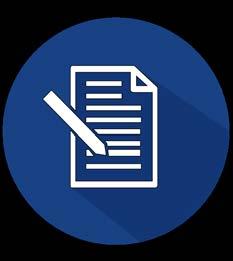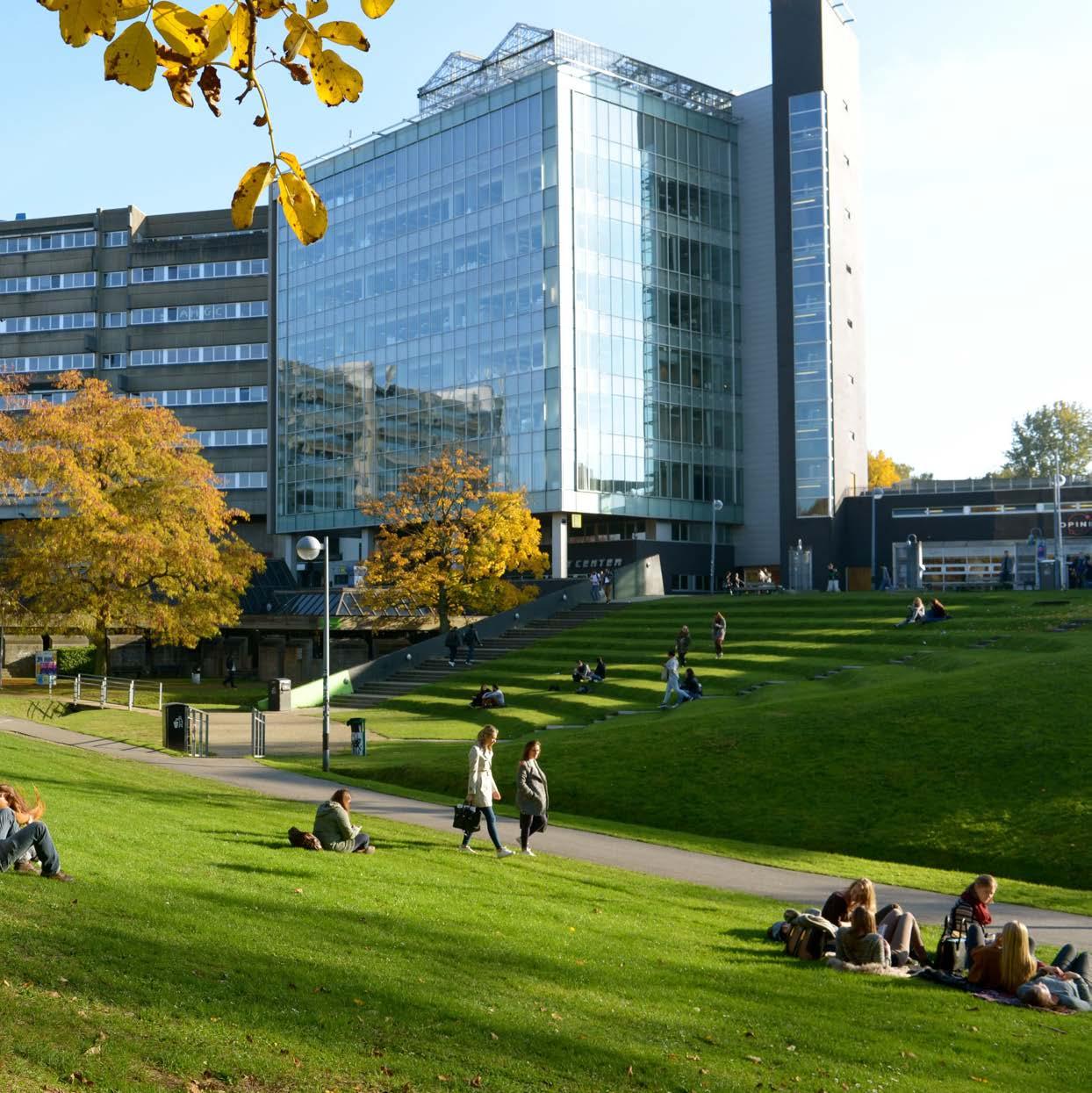
7 minute read
MESSAGE FROM THE PRESIDENT
In one year, the world has become a different place. Last year, we were teaching full classrooms, organizing dozens of events, hoping that the then ‘upcoming’ pandemic would not affect university life too much. Today, we know the results: forced distance learning, a massive reduction of international students, and a standstill on all mobility. Institutes like ours, that thrive on international students, exchange programmes and global networking, were hit hard by Covid-19 and by the subsequent government measures that restricted our activities and our ability to reach out beyond our national borders. Student recruitment was more difficult than ever, and scientific outreach through conferences and events was close to impossible. In that respect, our major biannual conference “the EU in International Affairs” had to be postponed, and many other colloquia and events underwent the same fate.
Those who suffered the most were our international students: stuck in their apar tments, student life came to a standstill. While many of them were unable to reach family or friends, others had to go back to their home country, unable to return to our campus.
In one year, Europe has become a different place too. With the omnipresent Corona-crisis, we would almost forget that meanwhile, the EU lost one of its member states, redefining its borders, its policies and its commerce. Our good partners in the UK are now excluded from Erasmus and other exchange programmes that for many years have created added value to students and researchers throughout the Union. While I am convinced that new ways of cooperation will inevitably present themselves, it is meanwhile a hard nut to crack.
But we stay optimistic. Notwithstanding the many challenges we faced, there were also many highlights. At no moment in time did we stop our work. Quite the contrary: since the star t of the pandemic, it has been “all hands on deck” to see to it that students and researchers could continue their studies in the best possible circumstances. And as we are using maritime references, we can for sure say that despite the storm, our compass is still steady and our ship is still heading in the right direction.
Indeed, despite the pandemic, 67 students graduated from our advanced master programmes – an all-time high. Thanks to our leading position in blended learning - a position we already held in the past two decades –the forced shift to distance learning went smoothly, and compared to other institutions we were better suited to continue high-level teaching to all our students. Teaching staff were given ample guidance to assure the quality of our education, which led to a high appreciation from our graduates. Thanks to this, and thanks to the reputation we have built over the past years, our student intake for the academic year 2020/2021 is quite good, with even a growth in our MSc programme.
Despite the pandemic, research also continued, although Covid-19 did affect the start of a few externally funded projects, and hampered collaborative international projects. Yet our staff were resilient and flexible, and we quickly found new ways of cooperating. The new conferences are called Zoom, or Teams, and the virtual world has given us new tools to continue our work. It is heartwarming to see that even in these dire circumstances, our researchers kept thriving, winning competitive research bids, publishing widely in prestigious journals and providing explanations on the most complex issues in written and spoken media (with more than 216 media appearances last year). Five PhD students were also able to defend their thesis, either through a virtual conference or in a covid-risk reduced aula – one even on the timely topic of blended learning in European Studies. Despite the pandemic, we tightened our bonds with our Korean and Japanese partners, and even set up a blooming Japan Programme at our Institute. With all that, I can only respect and congratulate our academic and supporting staff for their relentless work in less-than-ideal circumstances over the past year.
Despite the pandemic, we also strengthened our ties with Vesalius College, which we already formalized last year. Under the umbrella “Brussels School of Governance”, we will henceforth work together in research and education, forming a partnership that can compete with similar research and teaching institutions worldwide. As the American philosopher Ralph Waldo Emerson said “Bad times have a scientific value. These are occasions a good learner would not miss”. And a good learner our newly-extended team definitely is!

Now that the proverbial dust has settled, and that vaccinations have started, things will inevitably go back to normal. Although it remains to be seen what the new normal will look like. I, for one, am confident that whatever physical, virtual or blended world we will choose to be, high-level teaching and the creative collision of ideas will continue to be necessary to lead our continent and the world to innovation, prosperity and peace. We are more than ever ready to play our role.
Karel De Gucht IES President
2020 was an "unusual" year, to say the least. Struck by a worldwide pandemic, the operations of universities and colleges changed dramatically, and the Institute was no exception to that. Following the country's lockdown in March, all physical events, including teaching, had to be postponed or "virtualized". Thanks to investments in e-learning and blended learning in the past, we succeeded to move our education programmes in a relatively smooth manner into a digital mode. It required a big adjustment from our staff but they all showed commitment and motivation to bring this to a good end. The biggest change was for the students, who found themselves isolated - often in a host country that was not theirs, as more than 90% of our students do not have a Belgian nationality.
Internationally-oriented institutions such as ours are hit hard by the pandemic. We had to cancel our exchange programmes, postpone our international conference, and temporarily put a hold on our global partnerships. That our friends at the University of Southern California, Seoul National University, Hankuk University for International Studies, Vienna's Diplomatic Academy, Warwick University, United Nations University and many other of our close partners suffered the same faith was of little consolation. We could only conclude that "we are all in this together" and that we had to make the best of it.
Making the best of it, is definitely what our researchers and staff have been doing. Despite the pandemic, our researchers were able to attract numerous new externally funded projects (increasing the total number from 35 to 46!), publish 97 articles in renowned journals, produce 23 policy briefs and deliver 216 media interventions. This proves that our Institute is of high relevance in the research community and a much sought-after public source for scientific and policy-oriented information.
Our two advanced Master programmes also flourished. Despite the difficult situation in which we found ourselves, our student numbers remained stable, with even an increase of students in our MSc in European Integration. That our student numbers in the LL.M. programme might drop was to be expected, as tuition fees went up from € 5.000 to € 13.000 in 2020. However, without Covid, we expected to remain at a similar level as in 2019. Unfortunately, quite a number of our selected students had to abort last-minute because of restricted visa regulations following national lockdowns. The LL.M. programme still hosts a total of 20 students who, despite the circumstances, remain enthusiastic and hopeful that they would still be able to have some physical contact with their peers and their professors in the current academic year. With 67 graduates in 2020, the Institute was also able to achieve more than the government-set goal of 50 issued diplomas per annum.





A programme that did not suffer from Covid-restrictions was the Postgraduate Certificate in European Policy-making, which for many years has been an online programme, with one physical element, i.e. an inter-university summer school in Brussels and Vienna, which this year also took place in a virtual setting. The success this year led to the aspiration of organising this twice per year (once as winter school, once as summer school, with at least one of these in a virtual mode-only). Although a few students preferred to defer their graduation until a physical summer school would be possible, many more joined just because an online offer was available.
The government agreement not only stipulates targets concerning advanced Master programmes, it also requires us to start two new PhD projects a year. We did so in 2020, following a call for projects in both the migration field as well as the security field. More PhD researchers joined on externally-funded projects. We were also particularly proud to see five of our PhD students graduate: Antonios Nestoras (political science), Alexandra Mihai (educational science), Klaudia Majcher (law), Laura Westerveen (political science) and Neepa Acharya (political science) all successfully defended their thesis at our Institute.
One of the most prominent elements in the IES Strategic Plan 2021-2025 concerned the creation of four new research centres. Building on the expertise we accumulated over the past two decades, and restructuring the synergies internally, within the Institute and the VUB/Vesalius College, and externally, with the reformulated policy priorities of the EU, the Board of the IES approved the creation of the following Centres: the Centre for Migration, Diversity and Justice, the Centre for Security, Diplomacy and Strategy, the Centre for Environment, Economy and Energy, and the Centre for Digitalisation, Democracy and Innovation. Each Centre is led by a director (or two co-directors) and will constitute a research hub in its field, strengthening research-led teaching in the existing and future programmes of the IES and pulling in more externally-funded contract research. It is also meant to operationalise the alliance between the IES and Vesalius College and provide the resulting Brussels School of Governance with an integrated research agenda.These research Centres were already successful in attracting externally funded projects: in 2020, we started one new FWO project, one new H2020 project, one new Jean Monnet project, one VUB-funded strategic research programme, two new projects with the Flemish Innovation and Entrepreneurship programme, various new projects within the Korea Chair and a brand new Japan programme. Unfortunately, due to Covid, the start of a number of these projects had to be delayed or postponed to 2021.

Eleven new people started on the Institute's payroll, while eleven people left, keeping the total number of staff members at the IES at 108 (52,3 FTE as opposed to 52,4 last year).
Unfortunately, the effect of the pandemic is mirrored in a magnified way in the financial numbers for 2020. With several exchange programmes suspended and difficult international student recruitment, we anticipated a significant loss in the course of 2020. With additional investments to oversee the digitalisation of our teaching, a number of externally-funded projects postponed or cancelled, the total effect of the pandemic is now estimated at ± € 300.000, either in lost income or in additional expenses. This leads to an exceptional loss in 2020 of € 250.000. The Institute hopes to recuperate a large part of this loss through the special corona government support mechanisms and will be filing a request to this end. As the effects of the pandemic will undoubtedly continue throughout 2021, such compensation will be necessary to allow us to continue to pursue our goals set forth in our strategic plan.



